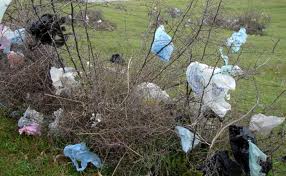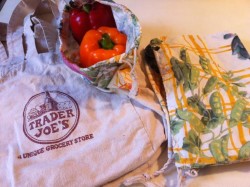 If you've driven down the Eisenhower Expressway recently, you know where I'm going with this. After the snow melted, six months of buried trash was suddenly exposed all along the highway. And it's the bags, fluttering in the wind, skittering across the lanes that grab attention and demonstrate their own polluting wastefulness.
If you've driven down the Eisenhower Expressway recently, you know where I'm going with this. After the snow melted, six months of buried trash was suddenly exposed all along the highway. And it's the bags, fluttering in the wind, skittering across the lanes that grab attention and demonstrate their own polluting wastefulness.
Hopefully the city will send out work crews soon. In the meantime, we want to encourage you to break your bag habit. Reason #1 is to help a good cause. We are happy to announce that the River Forest Whole Foods has chosen Green Community Connections as the recipient community group for their "One Dime at a Time," bring-your-own-bag program. Every time you shop there now through June 30, bring your own grocery bags and let the cashier know you'd like Whole Foods to donate 10 cents for each of your bags to Green Community Connections. It's all about building new habits
Eliminating single-use plastic bags from our lives is all about building new habits. Some people keep a stash of reusable bags in their cars. Others throw a few in their purse, coat pocket or bike bag. And for small trips, many people find it's easy to refuse a bag and carry a few items in their hands. On Saturday mornings, I write my grocery list, tuck it into the bag of bags I keep in my pantry, and hang them on my front door knob, where I'm sure I won't forget them.
Some of the misinformation promoted by the plastic industry claims that single use plastic bags are necessary because reusable bags are germy. I don't know about yours, but my grandparents did just fine without plastic bags. However, if you are hyper vigilant about germs, why not use washable cloth bags? Check out Etsy.com. Find a seamstress in your family or at the Oak Park Women's Exchange. If you enjoy estate sale or yard sale shopping, you can find a pretty old table cloth or sturdy sheets, instead of sewing new fabric. This past summer, I sewed myself a coordinated set of cloth produce bags from a vintage table cloth...I get compliments on them all the time.
Using humor to encourage conservation
Still, changing habits is challenging – even if it’s something we really want to do! Two of our One Earth Film Fest team members recently participated in the DC Environmental Film Festival and attended a session titled, “Can Comedy Encourage Conservation? “ Check out this quirky, fun short film about what it might take to motivate people to bring their own bag to the store as an example of the humorous films that were shared.
This video, produced in DC, supports a 2-cent tax on bags. Many other cities across the country have banned or taxed plastic bags. This spring, Chicago's city council is debating a full-out ban on bags. If you live within city limits, get involved in that effort. Contact your alderman to let him or her know you support the measure. Find Facebook pages, such as Bring Your Bag Chicago, to get the latest updates. Perhaps you may be moved to create a similar campaign in Oak Park, River Forest or in your town? Look for or start online petitions on sites like Change.org. Band with friends and attend a city council meeting or talk to community leaders.
REFUSE, reduce, reuse and recyle
We all know the environmental impact of single use plastic items, which are made from petroleum--a big strike right there. Even when waste haulers recycle plastic bags, as does Waste Management, Oak Park's residential waste hauler, the bags are only recycled once...turned mainly into plastic lumber used in decks and building trim, according to Earth911. Sure, the plastic will stay out of the landfill for 10, 20, 30 years or more, but since most plastic lumber is mixed with other materials, it can't be recycled again.
Refuse, Reduce, Reuse, Recycle. Since recycling is the last resort in an earth-friendly life, let's not settle so easily. Refuse those plastic bags, and start a new habit today!
Visit GCC's website for more information about waste reduction and recycling: http://www.greencommunityconnections.org/resources/waste-reduce-reuse-recycle/
Submitted by Laurie Casey
